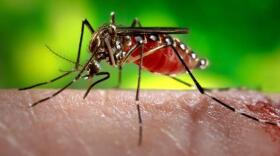
Scott Hensley
Scott Hensley edits stories about health, biomedical research and pharmaceuticals for NPR's Science desk. During the COVID-19 pandemic, he has led the desk's reporting on the development of vaccines against the coronavirus.
Hensley has worked on award-winning investigations in collaboration with journalistic partners.
He was the lead NPR editor on an investigation with the Center for Public Integrity in 2018 that exposed drug industry influence on the choices of preferred medicines by Medicaid programs. The work won the 2019 Gerald Loeb Award for audio reporting.
In 2017, Hensley was the lead NPR editor on an investigation with Kaiser Health News that showed how the pharmaceutical industry exploits government incentives intended to encourage the development of treatments for rare diseases. The stories won the 2019 digital award from the National Institute for Health Care Management.
Hensley has been editing in his current role since 2019. He joined NPR in 2009 to launch Shots, a blog that expanded to become a digital destination for NPR health coverage.
Before NPR, Hensley was a reporter and editor at The Wall Street Journal. He was the founding editor of The Wall Street Journal Health Blog, which focused on the intersection of health and business. As a reporter, he covered the drug industry and the Human Genome Project.
Hensley served on the board of the Association of Health Care Journalists from 2012 to 2020.
He has a bachelor's degree in natural sciences from Johns Hopkins University and a master's in journalism from Columbia University.
Before becoming a journalist, Hensley worked in the medical device industry. He remains, now and forever, a lover of Dobermans, lacrosse and Callinectes sapidus.
-
Advisers to the Food and Drug Administration voted 20-0 to recommend that the agency authorize Moderna's vaccine for emergency use during the pandemic. There was a single abstention.
-
Two days before a panel of experts is set to review Moderna's COVID-19 vaccine and advise the Food and Drug Administration, documents show the vaccine is 94% effective and well-tolerated.
-
In a 17-4 vote, an expert committee concluded that the scientific evidence supports the authorization of the COVID-19 vaccine from Pfizer and BioNTech for emergency use during the pandemic.
-
The Food and Drug Administration finds "no specific safety concerns" that would stand in the way of authorization of the vaccine for emergency use. Effectiveness is 95% after two doses.
-
The president, who tested positive for the coronavirus, "has completed his first dose and is resting comfortably," physician Sean Conley said in a statement.
-
Donald Trump drew fire in recent debates for his lack of specifics on how he would change the country's health care system. He released a plan Wednesday that is unlikely to satisfy critics.
-
Since 1970, the national colorectal cancer death rate has been cut in half. But progress has lagged in the Lower Mississippi Delta, Appalachia and counties in eastern Virginia and North Carolina.
-
Abuse of narcotic painkillers is a national problem. But it turns out that where you live can make a big difference in how likely you are to get a prescription for the medicines.
-
The legal wrangling over who should be allowed to buy the Plan B One-Step morning-after pill without a prescription came to an end this year. A federal judge ruled that the emergency contraceptive couldn't be withheld from girls 16 and younger. Despite the legal ruling, many Americans support age minimums and parental consent.
-
Dengue fever was commonplace in Florida until the 1930s. Air conditioning, window screens and better mosquito control helped break the dengue cycle. Now the mosquito-borne illness is back.








